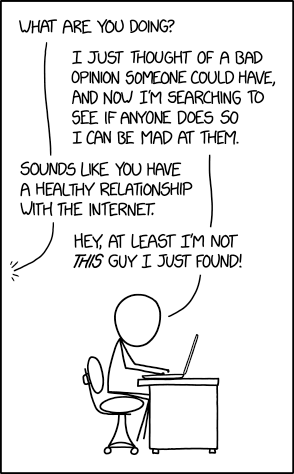Bad Opinions

I thought of another bad opinion! I couldn't find anyone who expressed it specifically, but still, the fact that I can so easily imagine it is infuriating! I'm gonna tell everyone about it!

I thought of another bad opinion! I couldn't find anyone who expressed it specifically, but still, the fact that I can so easily imagine it is infuriating! I'm gonna tell everyone about it!
Cueball is imagining bad opinions, searching them up on the Internet, and becoming angry with the people holding said opinions. An offscreen character, upon learning about this, sarcastically remarks that this indicates a "healthy relationship with the internet." Of course, if Cueball wasn't thinking of all these bad opinions, they most likely wouldn't have come to his attention, and he wouldn't have an opportunity to be mad about them. The fact that Cueball is the cause of his own agitation is the joke of (or perhaps, the sad part of) the comic. Cueball misses the offscreen character's point and remarks that he's not as bad as some person he has discovered, presumably through the aforementioned method of searching for bad opinions he thinks up.
In title text he goes further, where he can't find an opinion he imagined on the internet, but still wants to discredit it, just because he is so infuriated by just being able to imagine it. This is similar to straw man fallacy, where someone attempts to discredit an opponent by misrepresenting their argument, rather than addressing their real point.
Ironically, the comic itself could potentially be considered an example of this kind of behavior. It is possible that Randall imagined the absurd person and behavior depicted in the comic, and wrote a comic satirizing it, without knowing if such a person actually exists.
The unhealthy conversation habits enabled by the Interblag has been a regular theme in xkcd. In fact, this is a rather obvious callback to one of the most popular xkcd comics, 386: Duty Calls, wherein Cueball is actively seeking to discredit and correct people who are "wrong" on the internet. This is later done in 2071: Indirect Detection.
Perhaps due to the inherent combination of disconnection and intense focus involved in use of the internet, it's pretty common for people to get into arguments online. Cueball has followed the trend of finding social success online by dedicating more time and energy to arguing pedantic points than his opponents. He's done this to such a great degree that he is now actively seeking possible arguments, even when the situations do not arise on their own. The end result is that his life has needlessly more stress, his interpersonal habits are those of contradiction and conflict, he makes unnecessary enemies, and he is always looking at a computer screen instead of his real world friends.